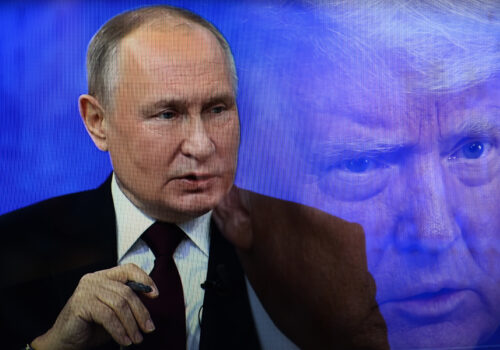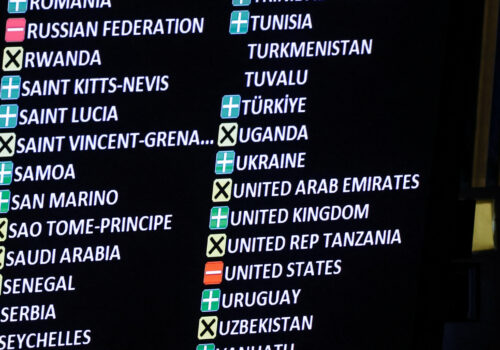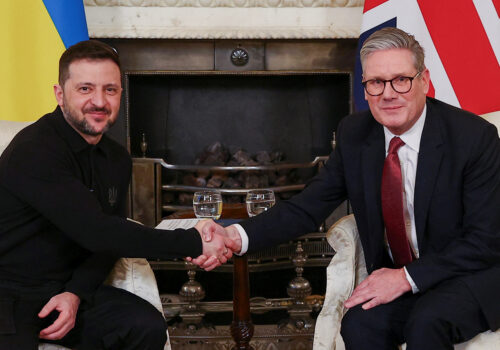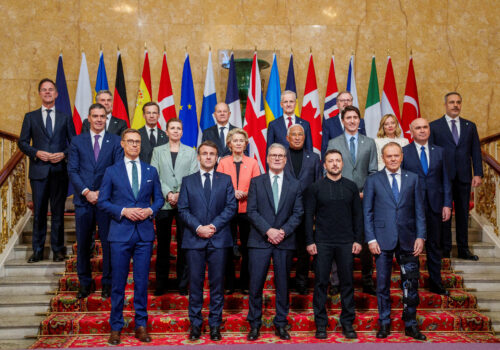Every spring, summer, and fall, Jimmy Draeger would walk the length of his 11-acre property with a hand sprayer and a tub of Roundup. He’d mist around the flower beds, the patio, the fence line, diluting the concentrated herbicide with water as the label directed.
Nestled deep in the woods of the Missouri Ozarks, Draeger was used to seeing an explosion of weeds and shrubs in the warm months at the home he’s shared with his wife, Brenda, for more than 30 years. He didn’t think much of using Roundup to keep them at bay.
Then he was diagnosed with stage four non-Hodgkin lymphoma. According to a lawsuit filed by the Draegers in 2022, Jimmy had a chemotherapy port installed in his chest, developed neuropathy in his hands and feet, and lost control of his bowels, coordination, and sexual function. He became clinically depressed, vision-impaired, and unable to bathe without Brenda’s help.
Monsanto, the agrochemical company behind Roundup, was to blame for Jimmy’s lymphoma, the Draegers contended. In November 2023, a jury agreed. Bayer, which acquired Monsanto in 2018, was ordered to pay the Draegers and two other plaintiffs a combined $1.56 billion in damages. (A judge later cut the payout for punitive damages, reducing the total awards to $611 million.)
The Draegers’ case is one of more than 160,000 Roundup lawsuits filed against Monsanto or Bayer since 2015, when the World Health Organization’s International Agency for Research on Cancer classified glyphosate, a key ingredient in Roundup, as “probably carcinogenic to humans.”
Most of the lawsuits hinged on failure-to-warn claims: the allegation that Monsanto, and later Bayer, failed to adequately notify customers of glyphosate’s potential cancer risk. Bayer has paid roughly $11 billion to settle these claims while denying any wrongdoing.
Now, the Environmental Protection Agency is considering a Bayer-backed rule that could significantly curtail the lawsuits.
Enter the EPA
Unlike the WHO, the EPA — which, headed by Trump appointee Lee Zeldin, has already announced massive regulatory rollbacks — does not consider glyphosate to be a likely human carcinogen.
“EPA’s cancer classification is consistent with most other international expert panels and regulatory authorities,” EPA Associate Administrator for Public Affairs Molly Vaseliou said in a statement to The Intercept. “EPA does not agree with IARC’s conclusion that glyphosate is ‘probably carcinogenic to humans.’”
Last August, 11 industry-friendly red states, led by Nebraska and Iowa, submitted a 436-page petition asking the agency to amend its labeling rules under the Federal Insecticide, Rodenticide, and Fungicide Act, or FIFRA. The proposed rule change would explicitly prohibit states from labeling pesticides and herbicides with warnings about cancer, birth defects, and reproductive harm if those notices contradict the EPA’s risk assessment.
The states made clear that their ultimate goal is to thwart future lawsuits against pesticide manufacturers. Their petition argued that recent court rulings have created a “gap in FIFRA’s regulatory framework” that the proposed rule change would plug.
“It’s telling of the lengths that pesticide manufacturers will go to make sure that nothing interferes with their profit margins.”
In January, in a move initiated by the Biden administration, the EPA took a first step of accepting public comment on the rule-making petition, with a deadline of March 24 — though this step is exploratory and does not mean a new rule will be issued. Still, the EPA’s decision could have disastrous consequences if Donald Trump’s second administration is as friendly to the chemical industry as it was in his first.
“It’s telling of the lengths that pesticide manufacturers will go to make sure that nothing interferes with their profit margins,” said Brett Hartl, government affairs director at the Center for Biological Diversity. “There’s a reality that the industry itself generates much of the data, and they say it’s safe, and then EPA approves that determination.”
“If we’re not limited to the industry-created data set,” he said, “they see it as a larger threat to their ability to control the universe of science and data that go into the pesticide regulatory review process.”
Warning Labels
The EPA petition follows in the path of other efforts at both the state and federal level to shield Bayer from civil liability.
Last year, state legislatures in Florida, Idaho, Iowa, and Missouri introduced bills that would make pesticide manufacturers immune to failure-to-warn lawsuits if their product labels match EPA assessments. And House Republicans introduced similar language in the discussion draft of the 2024 Farm Bill.
Though all the bills failed, allies of the chemical industry are expected to redouble their efforts this year. Advocates expect at least 21 states to introduce pesticide immunity legislation in 2025. The Florida Senate already has.
Bayer itself bankrolled the push, spending nearly $8.5 million to lobby the federal government in 2024, including to advocate for the “uniformity of pesticide labeling” under FIFRA.
FIFRA already prohibits the sale of “misbranded” pesticides, which includes requiring state health warnings to conform with EPA-approved labels.
“We are very pleased to see the EPA and several state Attorneys General take this step to reinforce that any state labeling requirements inconsistent with EPA’s own findings and conclusions regarding human health, such as a pesticide’s likelihood to cause cancer, constitute misbranding,” Bayer said in a statement to The Intercept. “It reinforces the urgent need for a solution to this issue created by the litigation industry.”
The raft of litigation over Roundup, however, has not always ended badly for Bayer. Federal appeals courts disagree on whether the FIFRA misbranding statute trumps state laws that may require manufacturers to go farther in adequately warning consumers about their products.
The 9th and 11th U.S. Circuit Court of Appeals have ruled in plaintiffs’ favor in recent years, finding that failure-to-warn claims against Bayer in state courts are consistent with FIFRA’s intent; the 3rd Circuit, meanwhile, found the opposite. The split could set the stage for a Supreme Court battle.
The EPA rule change proposed in the states’ petition aims to remedy the circuit split by explicitly classifying labels as “misbranded” if they include health warnings that exceed the EPA’s risk assessment.
The agency’s position on glyphosate has been mired in controversy for decades. In 1991, the EPA mysteriously changed its classification from “suggestive evidence” of glyphosate’s carcinogenic potential to “no evidence.”
Since then, documents released in Roundup litigation have shown Monsanto cozying up to EPA regulators, ghostwriting scientific papers on glyphosate’s safety, and actively working to discredit journalists and WHO.
In 2015 — the same year the international body’s cancer bureau classified glyphosate as a probable human carcinogen — The Intercept reported that the EPA had overwhelmingly used Monsanto’s own research to conclude that glyphosate was not an endocrine disruptor.
In 2016, an internal EPA analysis noted an association between glyphosate exposure and an increased risk of non-Hodgkin lymphoma in four epidemiological studies, The Intercept reported. The EPA analysis was never made public. Instead, the agency drew from industry-backed studies in 2016 to conclude that glyphosate was “not likely to be carcinogenic to humans.”
“The industry itself generates and pays for much of this data, so that is very different of course than peer-reviewed, hypothesis-based, independent science,” said Hartl, of the Center for Biological Diversity. “That creates an inherent tension and conflict of interest.”
“EPA’s long-standing practice is to seek input from a variety of stakeholders and use the best available science,” said Vaseliou, the EPA public affairs official. “EPA evaluates information from all kinds of sources — pesticide companies, other governments, academia, and the published scientific literature.”
In 2020, during the periodic pesticide review process mandated by FIFRA, the EPA issued an interim decision to reregister glyphosate with a risk assessment that did not identify “any human health risks of concern.” But in June 2022, in a separate case from the FIFRA ruling, the 9th U.S. Circuit Court of Appeals vacated the EPA’s assessment, noting the decision had been made without following the agency’s own cancer guidelines, and ordered the EPA to reevaluate its findings.
The new analysis is still forthcoming.
“In accordance with the court’s decision related to human health, EPA is currently updating its evaluation of the carcinogenic potential of glyphosate to better explain its findings and include the current relevant scientific information,” said Vaseliou. “EPA’s underlying scientific findings regarding glyphosate, including its finding that glyphosate is not likely to be carcinogenic to humans, remain the same.”
Trump’s MAHA Promise
How the EPA decides to proceed with the glyphosate petition will in many ways be a canary in the coal mine for this administration’s approach to chemical regulation.
While Trump’s first term was marked by severe deference to industry, his recent rhetoric has promoted Secretary of Health and Human Services Robert F. Kennedy Jr.’s “Make America Healthy Again,” or MAHA, agenda.
In a February executive order, the president pledged to eliminate “undue industry influence” and “establish a framework for transparency and ethics review in industry-funded projects” — the same reforms that advocates have long said would strengthen the EPA’s glyphosate review.
Kennedy is a longtime critic of the pesticide industry; in an October YouTube video, he railed against the country’s agriculture policy for “tilting the playing field in favor of more chemicals, more herbicides, more insecticides” and promised to “ban the worst agricultural chemicals that are already prohibited in other countries.” As a lawyer with the Natural Resources Defense Council, a leading nonprofit environmental law group, he took Monsanto to task, helping secure a multimillion-dollar settlement in a Roundup cancer lawsuit in 2018.
There are indications, of course, that the MAHA promise is a smokescreen.
In 2017, Trump’s EPA rejected a proposed ban on chlorpyrifos, a pesticide linked to increased cancer risk. He appointed former American Chemistry Council executive Nancy Beck to oversee toxic chemical regulation. Beck is once again slated to take a senior EPA position; Lynn Dekleva, another ACC lobbyist who fought the EPA’s efforts to regulate formaldehyde, will now run the agency’s Office of Chemical Safety and Pollution Prevention.
Vaseliou said, “Your questions regarding Dr. Beck and Dr. Dekleva are insulting and unfounded. This is yet another question based on false accusations that left propaganda also known as media take as gospel. President Trump made a fantastic choice in selecting Dr. Beck and Dr. Dekleva to work at EPA.”
On March 12, Zeldin, Trump’s EPA chief, announced the agency would begin rolling back 31 environmental regulations — “the greatest day of deregulation our nation has seen,” he said — including rules aimed at preventing disasters at hazardous chemical facilities and restricting the industrial pollution of mercury.
“It strikes me that there’s a very significant tension between what the president has promised relating to the overuse of pesticides in this country versus the other elements of his own administration that reflexively do what industry wants no matter what,” said Hartl. “He’s going to have to decide who he’s going to let down: whether it’s his own supporters that believe in his MAHA agenda or his industry benefactors.”
The post Trump EPA’s Next Move: Making It Harder to Sue for Getting Cancer from Roundup appeared first on The Intercept.



















